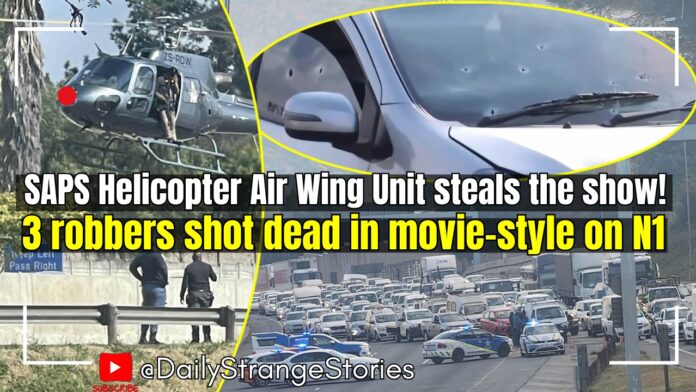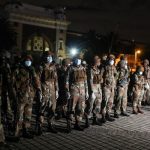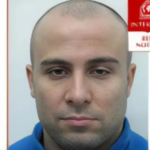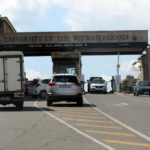Lights flash, sirens wail, and the unmistakable thud of rotor blades fills the air. This isn't a scene from an action movie; it's a snapshot of life on the N1 highway in Sandton, South Africa, on a day that forever changed for those who witnessed it.
On that day, law enforcement confronted a group of alleged house robbers in a dramatic shootout that resulted in three fatalities and one arrest. The incident, which unfolded on Thursday, highlighting the ongoing struggle against organized crime in the affluent suburbs of Johannesburg.
The story began earlier that day, when police received information about suspects who had allegedly committed a house robbery in Randburg, a neighboring suburb known for its mix of residential areas and business districts. The suspects, believed to be part of a syndicate targeting homes in the northern suburbs, had reportedly made off with several household appliances and the homeowner’s Volkswagen Polo.
Responding to the call, officers from the Gauteng Highway Patrol, along with the Gauteng Traffic Airwing and a private security company, Cap Security, mobilized to track down the suspects. The airwing, with its helicopter, provided crucial aerial support, allowing officers to monitor the suspects' movements from above.
The suspects were spotted driving on the N1 highway, one of the busiest freeways in South Africa, connecting Johannesburg with other major cities. As police attempted to intercept the vehicles, the situation escalated rapidly. According to police spokesperson Colonel Mavela Masondo, the suspects opened fire on the officers, triggering a high-stakes shootout.
The incident brought traffic to a standstill. Motorists watched in disbelief as the drama unfolded, with gunshots echoing across the highway. The police helicopter hovered above, providing cover for the officers on the ground.
Following the shootout, officers recovered two firearms and the stolen appliances from the suspects' vehicle. The suspects are believed to be part of a syndicate that has been terrorizing homeowners in the northern suburbs of Johannesburg. They are now facing a string of charges, including attempted murder, possession of unlicensed firearms, house robbery, and possession of suspected stolen property.
The incident sparked a wave of reactions from the public, with many expressing relief and gratitude towards the police for their swift and decisive action. One Facebook user, Andre Snyman, captured the sentiment of many South Africans when he wrote, "Today’s incident near St. Peter’s School is one of those moments that cuts through the noise. This isn’t a movie — it’s real life in South Africa."
Snyman praised the SAPS units for their effectiveness, saying, "Credit where it’s due — well done to the response teams." He also acknowledged the fear and frustration felt by many South Africans, adding, "We are tired, scared, and fed up. But we are also thankful when justice is served fast and hard."
The incident on the N1 highway underscores the challenges South Africa faces in its fight against organized crime. House robbery, in particular, is a prevalent issue in affluent areas like Sandton, where criminals often target homes with sophisticated security systems.
The reasons behind the high rate of house robberies in South Africa are complex and multifaceted. Socioeconomic factors, such as poverty, inequality, and unemployment, play a significant role. Many people feel marginalized and excluded from the economic mainstream, leading them to turn to crime as a means of survival.
The legacy of apartheid, with its deep-seated racial and economic disparities, continues to cast a long shadow over South African society. The transition to democracy has been uneven, and many communities still lack access to basic services, such as education, healthcare, and housing.
The effectiveness of the criminal justice system is also a factor. High crime rates, coupled with a backlog of cases and limited resources, can strain the system, making it difficult to bring perpetrators to justice. Corruption within the police force and other government institutions further undermines the fight against crime.
In response to the ongoing threat of house robberies, many homeowners in Sandton and other affluent suburbs have invested heavily in security measures, such as high walls, electric fences, alarm systems, and armed response services. Private security companies play a significant role in crime prevention and response, often working in close collaboration with the police.
Community policing initiatives are also gaining traction, with residents forming neighborhood watches and working together to improve security in their areas. These initiatives aim to foster a sense of collective responsibility and empower communities to take an active role in crime prevention.
The incident on the N1 highway is not an isolated event. It is part of a larger pattern of organized crime that plagues many parts of South Africa. Cash-in-transit (CIT) heists, in which armed robbers target armored vehicles transporting money, are another major concern.
The suspects were apprehended after a high-speed chase. Preliminary investigations revealed that they were out on bail after allegedly committing CIT robberies in Gauteng, Mpumalanga, and Limpopo provinces. Police are still searching for six more suspects involved in the heist.
The fact that the suspects in the CIT heist were out on bail highlights another challenge facing the criminal justice system in South Africa. The granting of bail to repeat offenders can undermine public confidence in the system and create a sense of impunity among criminals.
Gauteng Police Commissioner Lieutenant General Tommy Mthombeni recently revealed that Gauteng accounts for a significant portion of the national crime rate. He also noted that robberies are a major contributor to the province’s murder statistics.
The police have launched several initiatives to address the high crime rate in Gauteng, including increased patrols, intelligence-driven operations, and partnerships with community organizations. However, the fight against crime is an ongoing struggle that requires a multi-faceted approach.

Follow Us on Twitter











